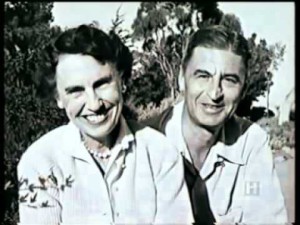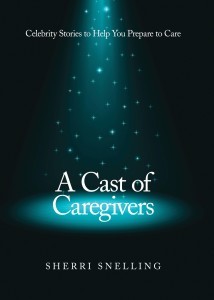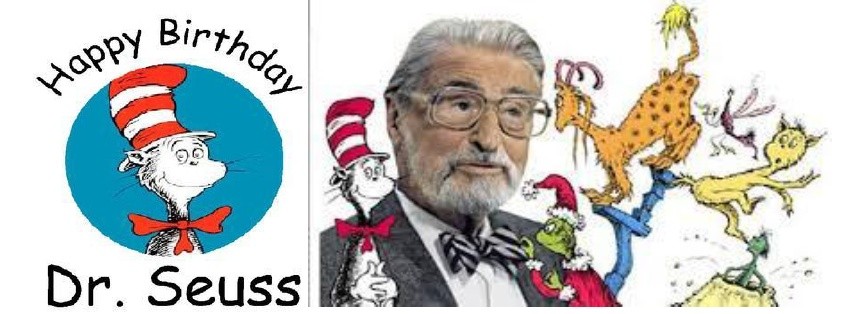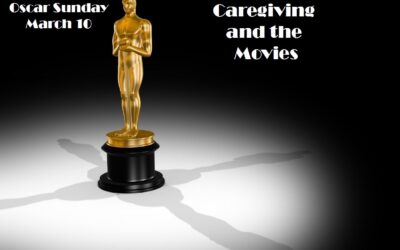Who Reads? We Read!
On March 2 every year, we celebrate Read Across America Day, the reading initiative started by the National Education Association in commemoration of the birthday of our beloved children’s book author, Dr. Seuss (whose real name was Theodor Geisel). Some of his most widely published children’s books included: The Cat in the Hat; Horton Hears a Who!; Green Eggs and Ham; One Fish, Two Fish, Red Fish, Blue Fish; and my favorite, How the Grinch Stole Christmas.
 Who Cares? He Cared!
Who Cares? He Cared!
What is perhaps the least known about Dr. Seuss is that he was a caregiver for his first wife, Helen Palmer Geisel, who was also a children’s book author. For several years during perhaps his most productive writing phase, Helen, suffered from several chronic illnesses including battling cancer. While Helen helped guide Theodor’s talents of his whimsical drawings of animals and the telling of their stories, Geisel gave his muse the love and care she needed throughout their marriage until her death in 1967.
In the years Geisel cared for his ill wife, there was not much recognition of the role of the spousal caregiver and even less support, especially for men who were caregivers. Since the Geisels did not have children, Geisel was primary caregiver for his wife during those years.
 Men As Caregivers
Men As Caregivers
In a 2009 study, Caregiving in the U.S., published by the National Alliance for Caregiving, at that time men made up about one-third of all caregivers. However, a 2012 Pew Research Center’s Internet and American Life Project reports men now comprise 45 percent of all family caregivers in the nation. And, according to a study by the Alzheimer’s Association, men caring for a family member with Alzheimer’s disease or dementia almost doubled from 19 percent to 40 percent from 1996 to 2011.
Often men’s caregiving duties are to handle the financial and legal paperwork, medical insurance and home safety modifications for an older parent. But, when it is spousal caregiving, as it was with Dr. Seuss, the caregiving duties can be all-encompassing.
And the emotional impact of caregiving hits men as much as women.
In the book, Who Says Men Don’t Care – A Man’s Guide to Balanced and Guilt-Free Caregiving, authors James V. Gambone and Rhonda Travland help men identify their caregiving style. The authors looked at four generations of men as well as male personality differences and identified the following caregiving styles: the Manager, the Searcher, the Loner, and the Techno-Virtual Caregiver. According to the authors, one issue for men is having a harder time asking for help.
“While all caregivers face stress and frustration, we found that men often have a harder time dealing with a caregiver role,” says Travland. “It’s very difficult for them to ask for help.”
While they may not seek help as readily as female caregivers, a 2012 study conducted by researchers at Bowling Green State University shows men may cope with caregiver stress better than women. The study looked at the differences in male and female caregivers of an older parent and how they dealt with stress.
“We found men seem better at dealing with caregiver stress because they take a ‘block and tackle’ approach to caregiving tasks,” says I-Fen Lin, associate professor and lead researcher on the study. “They complete a caregiving task and move on to the next thing. Conversely we found women are more socialized to be nurturing but they internalize their caregiving performance with constant worry and anxiety, thus, leading to higher stress levels and more persistent stress.”
During Geisel’s caregiving years support groups for caregivers were virtually non-existent. In today’s world, whether in-person support or virtual online support is a growing area of the caregiving world. Homewatch CareGivers, a comprehensive home care agency founded in 1980, created what it’s billing as the first online community for male caregivers. The online forum provides male caregivers with crucial caregiving information from peers such as how to deal with sundowning of an Alzheimer’s loved one, how to bathe a parent of the opposite sex or what advice veteran caregivers have for a new caregiver. According to the site, men are more likely to use the internet to seek information and support but less likely than women to seek caregiving training which makes the forum a vital resource for men who are caregiving.
When it comes to caregiving, we all have to find ways to get support so we can continue to have balance in our lives – whether it is writing a book, coaching a soccer team or working at a demanding job. While Dr. Seuss wrote for children, his lessons on life impact all ages. These words from our beloved Dr. Seuss should help caregivers to feel empowered to find that balance and remember that their own health and wellness is in their hands and their hearts:
 To read more about men as caregivers and resources that can help, get Sherri Snelling’s book, A Cast of Caregivers – Celebrity Stories to Help You Prepare to Care.
To read more about men as caregivers and resources that can help, get Sherri Snelling’s book, A Cast of Caregivers – Celebrity Stories to Help You Prepare to Care.
You can also read Sherri’s other blogs about men as caregivers:
Billionaire caregiver David Murdock, CEO of Dole
©2015 Sherri Snelling







Thank you so much for mentioning the Male Caregiver Community in this article! I never knew that Dr. Seuss was a family caregiver. Such an inspiration!
I noticed this article fails to mention the fact that Theodore was unfaithful to his ill wife, and that her death was caused by what was ruled as suicide, not of natural causes.
http://www.nytimes.com/2000/11/29/nyregion/public-lives-mrs-seuss-hears-a-who-and-tells-about-it.html
Dr. Suess cheated on his wife with his current widow while his first wife was dying of cancer, so she killed herself by intentionally overdosing on barbituates.
Source: The New York Times “PUBLIC LIVES; Mrs. Seuss Hears a Who, and Tells About It” By JOYCE WADLER, NOV. 29, 2000
We’re just going to overlook the adultery that occurred during her illness and her suicide note to him because she was so distraught over it? Umm… ok.
Give me a break. Dr Seuss’ first wife committed suicide because he was cheating on her with a woman 18 years his junior, while she was home, suffering. “Helen Geisel struggled for more than a decade with partial paralysis from Guillain-Barré syndrome and cancer. Depressed by her worsening symptoms and by her husband’s affair with a close friend who would become his second wife, Helen took her own life in October 1967 at the age of 68. “I am too old and enmeshed in everything you do and are, that I cannot conceive of life without you,” read her suicide note. “My going will leave quite a rumor, but you can say I was overworked and overwrought. Your reputation with your friends and fans will not be harmed.”
The male caregiver narrative is ruined by stating the whole truth, that he was cheating on his ill wife, which ultimately led to her suicide. And he went on the married the women from his affair, Audrey.